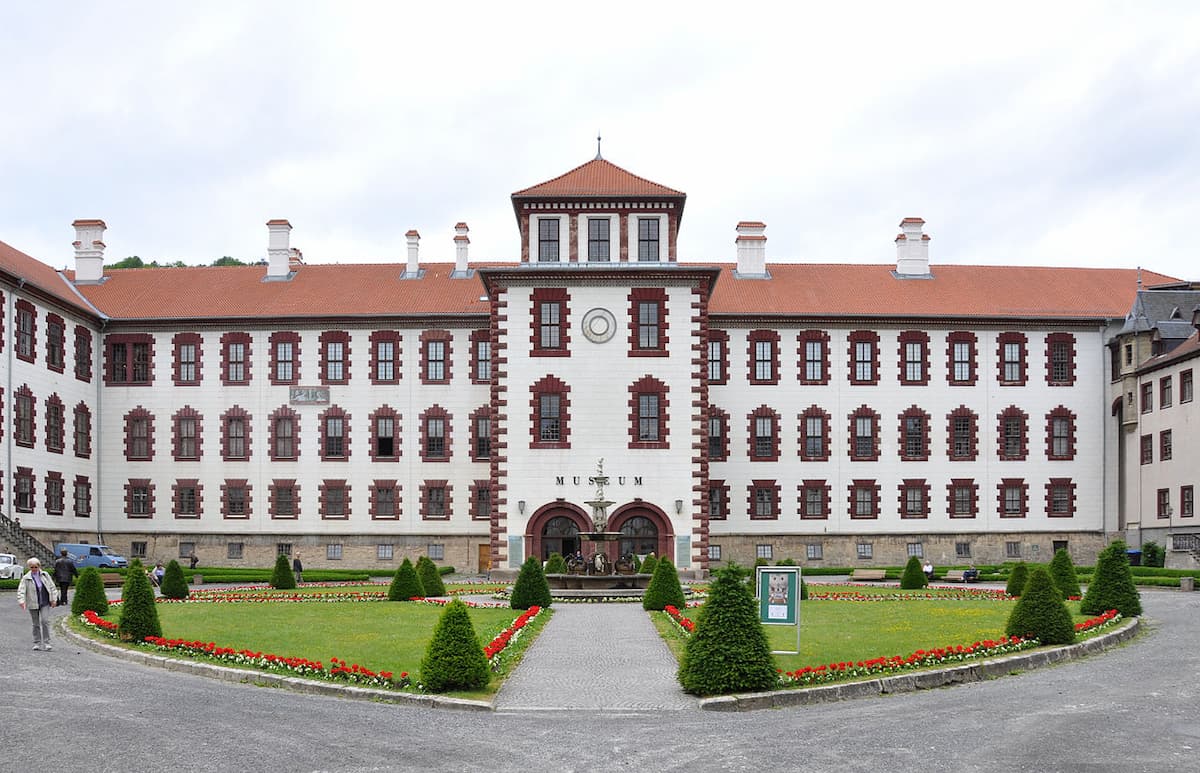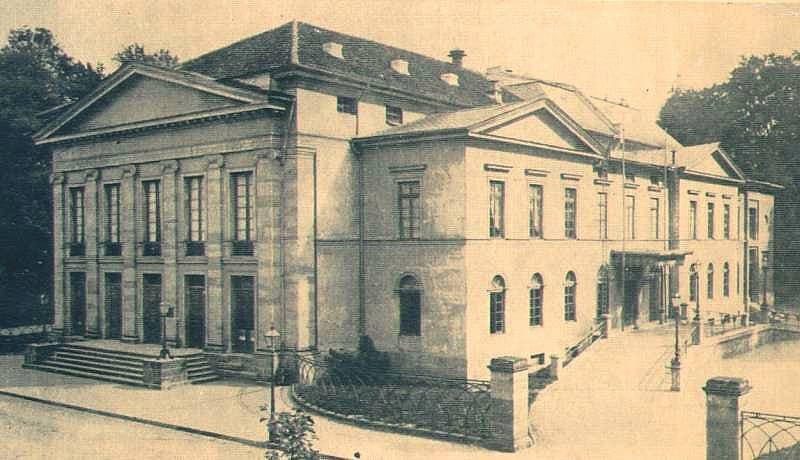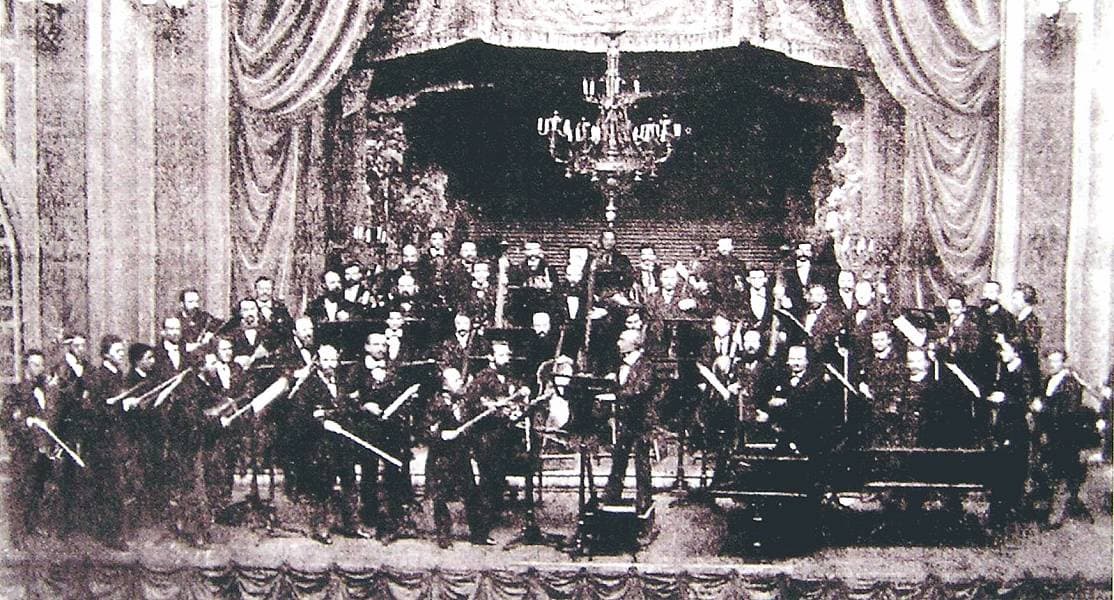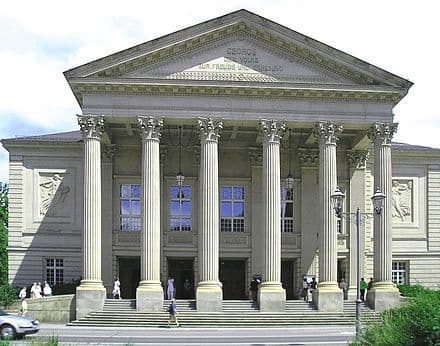The small town of Meiningen is located in the southern part of the state of Thuringia. It was founded in the 6th and 7th centuries during the formation of the Frankish Empire, and over time it became the capital of the duchy of Saxe-Meiningen. It took almost 10 years, from 1682 and 1692, to construct the ducal palace “Schloss Elisabethenburg” on the northwest edge of the town.

Meiningen, Schloss Elisabethenburg
That Baroque palace was built on the site of a late Gothic castle, with three wings and a central tower forming the letter “E.” And since every serious palace needs a bit of music, Duke Bernhard I founded the Meiningen Court Orchestra in 1690. The Duke served as its first music director, but in 1711 Johann Ludwig Bach, second cousin of Johann Sebastian Bach, was appointed for that job. We know that Johann Ludwig performed several of his cantatas in Meiningen and Leipzig, and BWV 15, previously attributed to Johann Sebastian might rightfully be the work of Johann Ludwig.
Johann Ludwig Bach: “Denn du wirst meine Seele,” (BWV 15) (Dorothee Mields, soprano; Henning Voss, alto; Henning Kaiser, tenor; Ralf Grobe, bass; Alsfelder Vocal Ensemble; I Febiarmonici; Wolfgang Helbich, cond.)

Meiningen theatre, rebuilt in 1908
Meiningen rose as a cultural center under the second Duke George (1826-1914). The Duke was crazy about the theatre, and he built himself a performance space in 1831. The “Meiningen Theatre” opened on 17 December 1831 and soon housed a dedicated theatre company. The Duke was himself involved in designing and directing various productions, and he took his theatre company and ensemble on extended and internationally celebrated European tours. The new performance venue became the home base for the Meiningen Orchestra, and following the lead of its theatrical sister company, they became Europe’s first touring orchestra. The Meiningen Orchestra had distinguished itself as the nucleus of the instrumental ensemble at the opening of Bayreuth, as they performed the premiere of the Ring of the Nibelungen in 1876. Under Hans von Bülow, the orchestra visited major European capitals “akin to making cultural conquests for the Duke.” The music critic Eduard Hanslick wrote, “Meiningen is to be sure, a remote little duchy with an enlightened and art-conscious Duke… By permitting his musicians and actors to go on month-long tours, he provides the most effective stimulus to his artists’ industriousness and extends the horizon of their ambition.”
Richard Wagner: Götterdämmerung, (excerpt)
The unified team-oriented artistic approach under strong directorial control became a hallmark of the Meiningen Orchestra. Hans von Bülow, who was appointed in 1880, initiated this concept and turned the ensemble into one of the finest orchestras on the continent. Bülow invited Brahms to come to Meiningen in 1881 to hear the orchestra, and to try out any new orchestral works.

Meiningen Court Orchestra with Hans von Bülow conducting, 1882
Over the course of several years, Brahms visited Meiningen over a dozen times and he reported to a friend, “You can’t imagine how wonderful it is to do music here, the chorus, the orchestra…everything is perfection.” And on 25 October 1885, Brahms premiered his 4th Symphony before the Duke in Meiningen. This was followed by a long orchestra tour with Brahms conducting the 4th Symphony and von Bülow the rest of the program. Bülow wasn’t particularly happy about this arrangement and decided that he wanted to conduct the Brahms 4th himself in order to show how much better a conductor he was. Tempers flared, and von Bülow angrily telegraphed his resignation to the Duke, who quickly appointed Bülow’s young assistant Richard Strauss to the post.
Johannes Brahms: Symphony No. 4, Op. 98 (Bavarian Radio Symphony Orchestra; Rafael Kubelík, cond.)
Richard Strauss began his conducting career as Bülow’s assistant with the Meiningen Court Orchestra in 1883. After Bülow’s resignation, Strauss served as that orchestra’s primary conductor for five months, and he conducted his Symphony No. 2 for Brahms. Brahms was not impressed and remarked, “This piling up of many themes based on a triad, which differs from one another only in rhythm, has no value.”

Meiningen Court Theatre
Strauss also met the composer Alexander Ritter who was working as a violinist in the Meiningen orchestra. Ritter was the husband of one of Richard Wagner’s nieces, and he convinced Strauss to abandon his conservative style and embrace the music of the future modeled by Wagner. But in the meantime, the Meiningen Orchestra played the world premiere of Strauss’ “Suite for Winds” Op. 4. Strauss remembered that he conducted his composition “in a sort of daze. All I can remember is that I didn’t make a mess of it. Whether it went well or not I could not say.” In addition, Max Reger was stationed in Meiningen between 1911 and 1914, and he composed and dedicated a number of important works to the Meiningen Orchestra. The Meiningen Theatre was destroyed in a fire in 1908 and replaced in 1909 by the current building.
For more of the best in classical music, sign up for our E-Newsletter
Richard Strauss: Suite in B-flat Major, Op. 4 (Blaser Ensemble Amade; Klaus Rainer Schöll, cond.)




